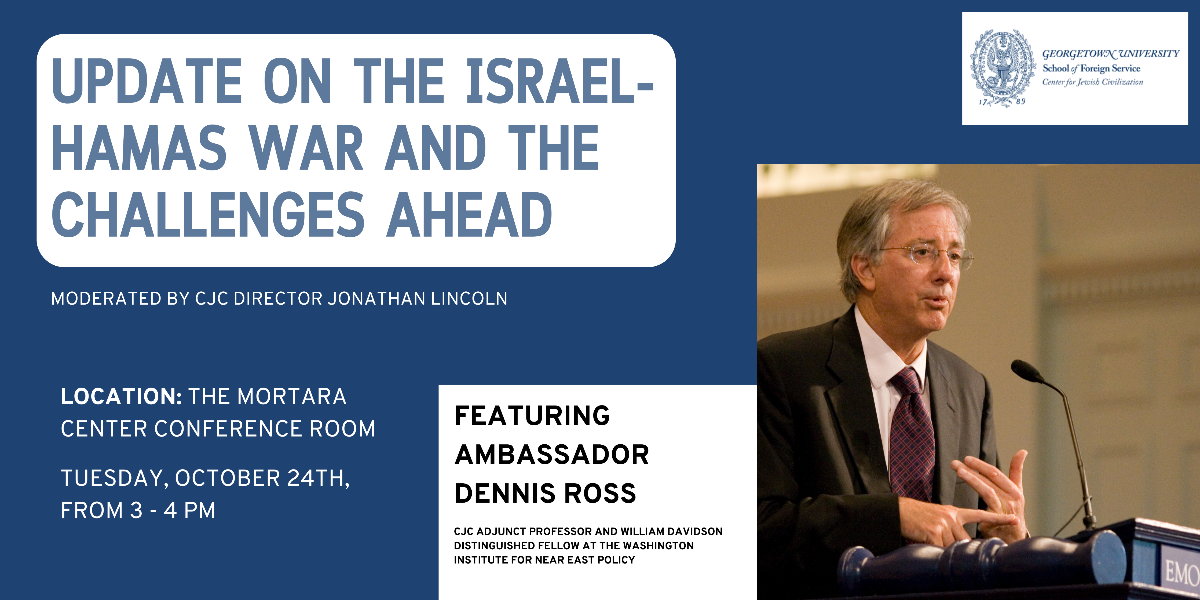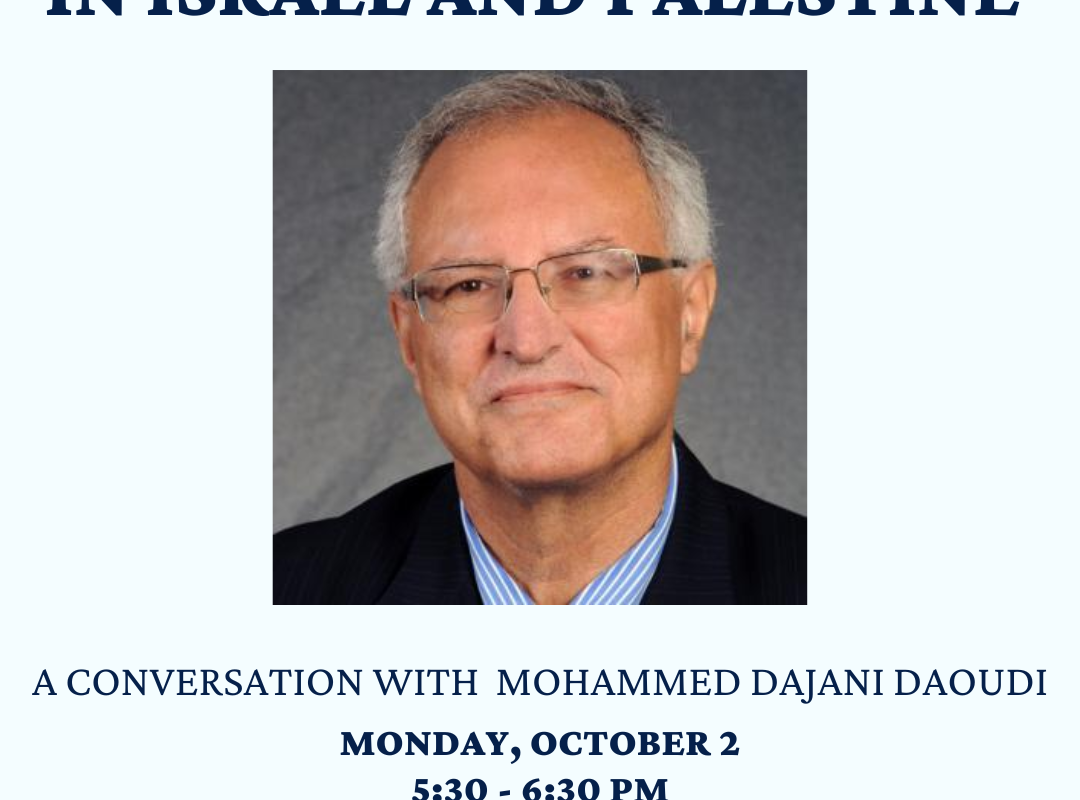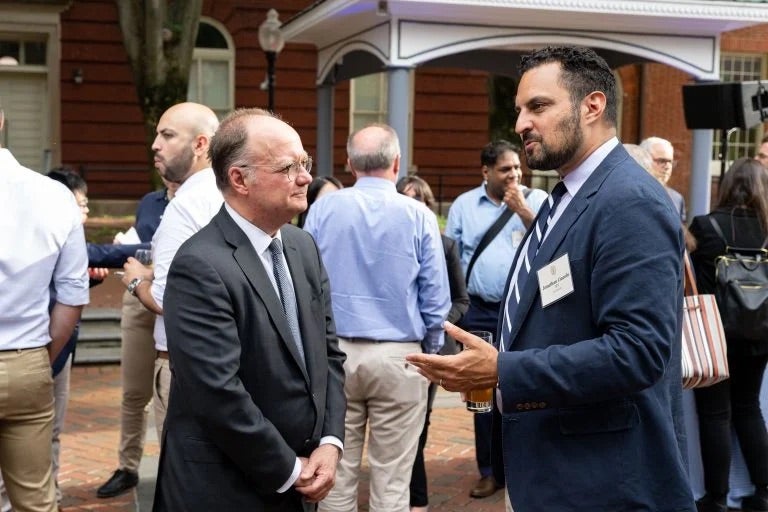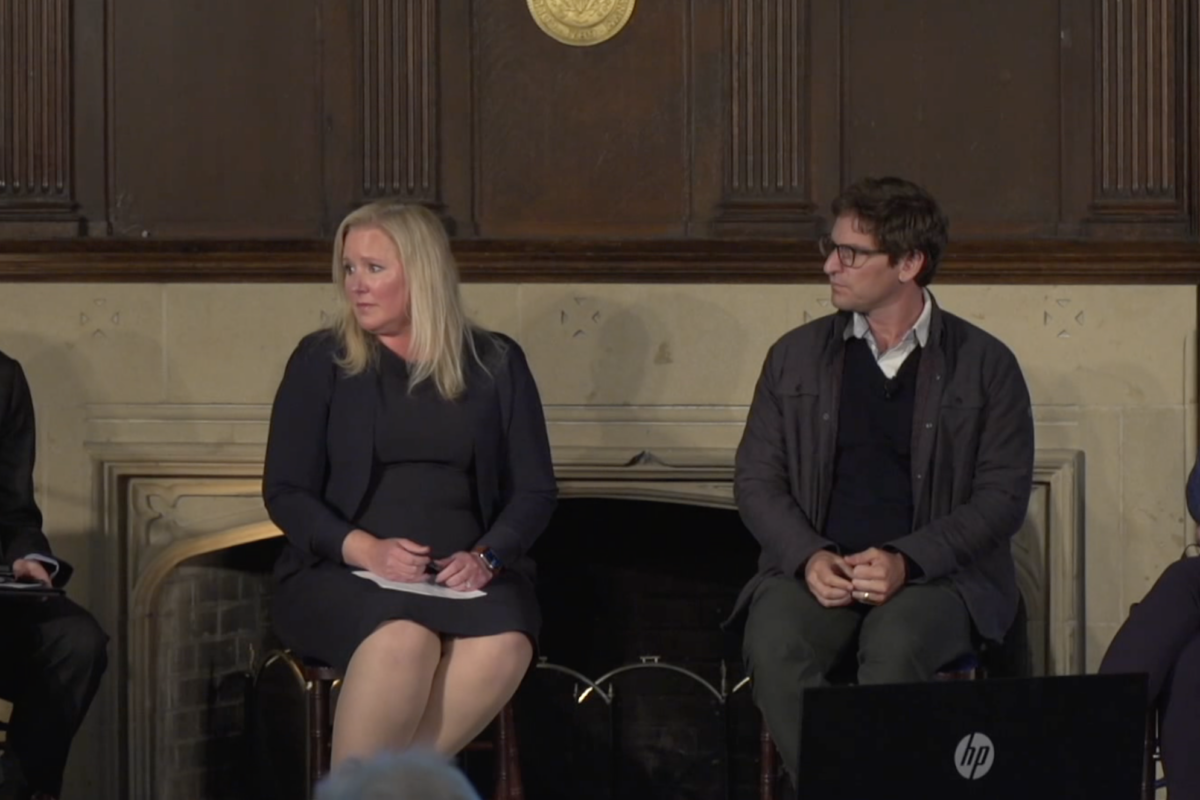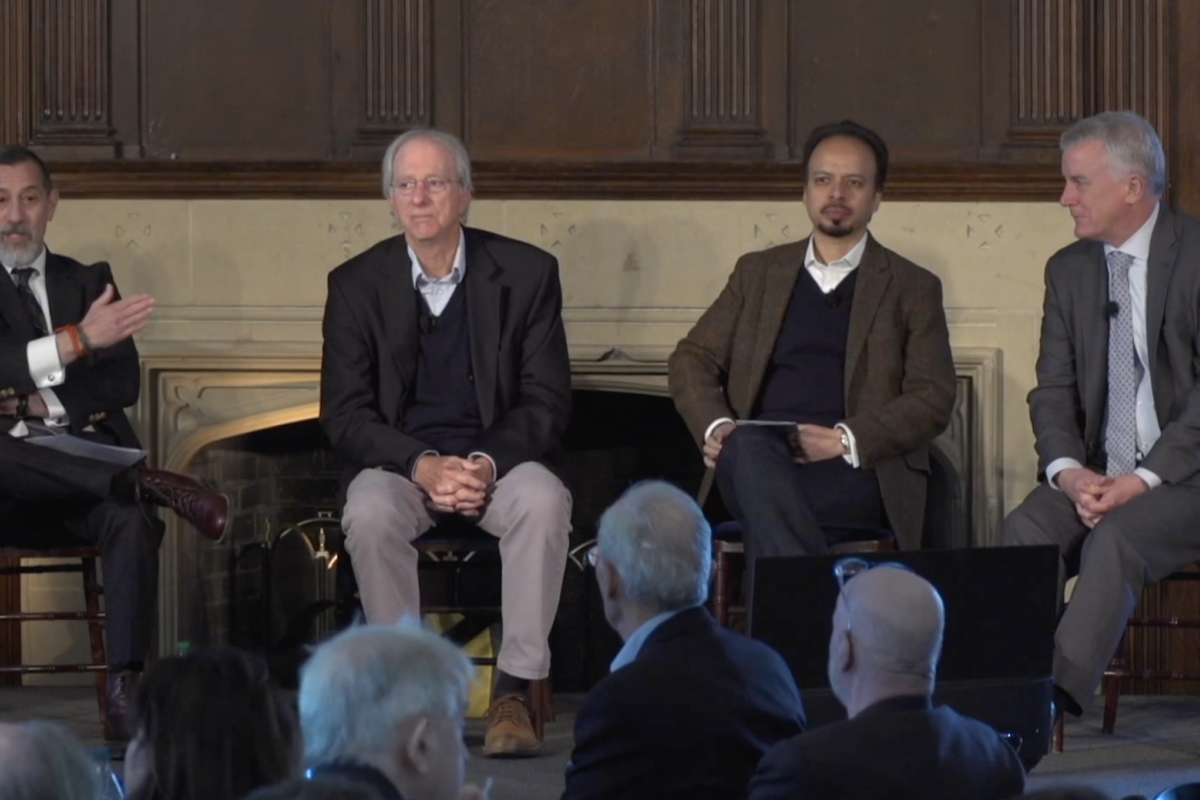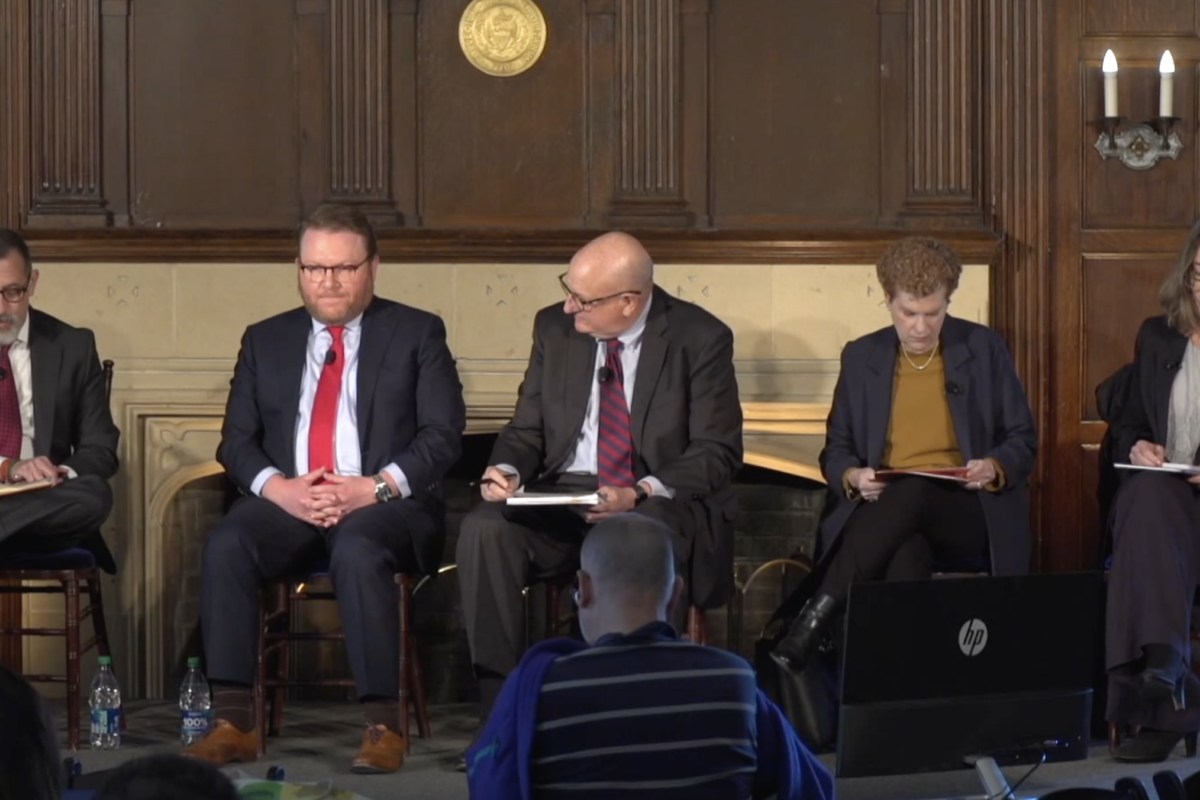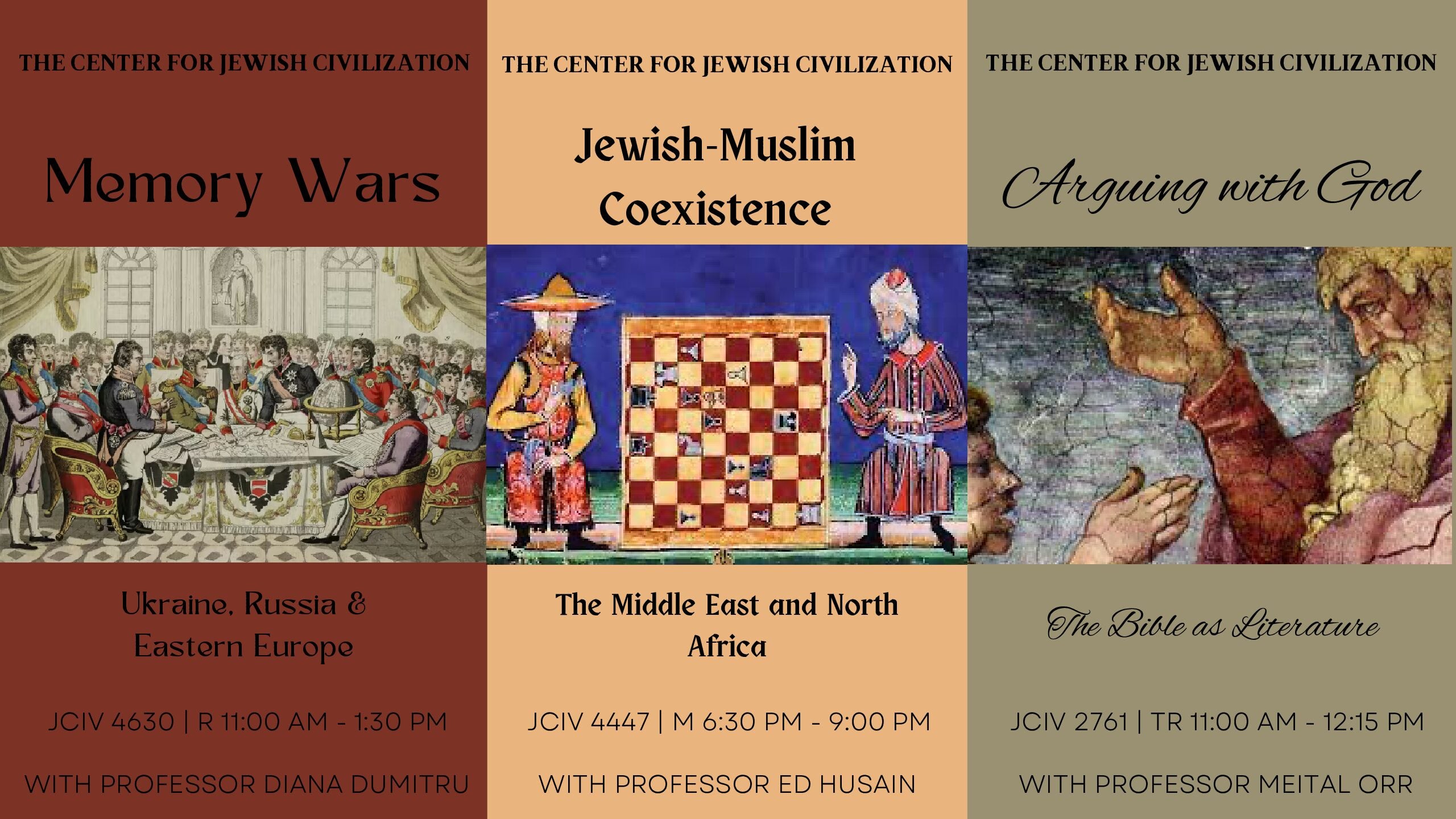Amb. Ross: Updates on the Israel-Hamas War and the Challenges Ahead
|
The Israel-Hamas War; How it Began and What Comes Next
Event Recording available HERE
|
|
A Discussion on the Situation in Israel and Gaza
Event Recording HERE
Listen to Goldman Visiting Israeli Professor Avraham Sela and CJC Director Jonathan Lincoln discuss the current situation in Israel and Gaza.
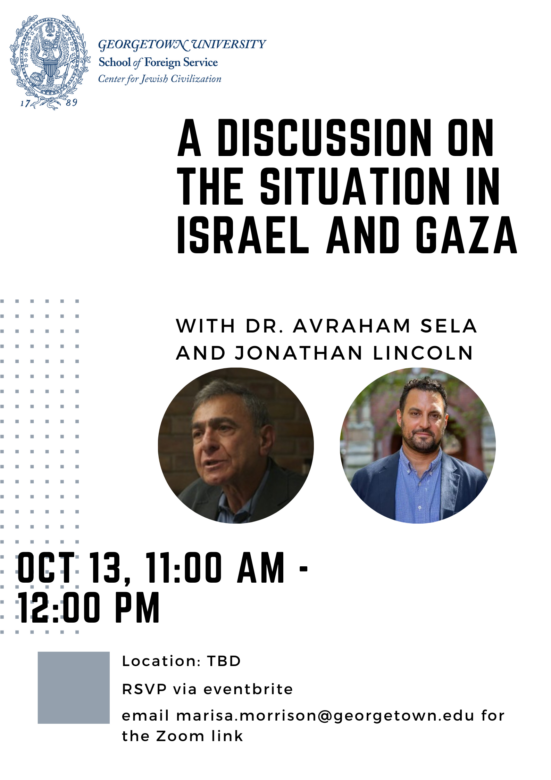
Promoting Coexistence in Israel and Palestine: A Conversation with Mohammed Dajani Daoudi
Event Recording HERE
The CJC and the Security Studies Program (SSP) hosted a conversation with Mohammed Dajani Daoudi, a Palestinian academic and social activist, about the importance of coexistence, dialogue, and mutual understanding and how Israelis, Palestinians, and the region as a whole can benefit from agreements such as the Abraham Accords, moderated by CJC Director Jonathan Lincoln.
New Interim Director of the Center for Jewish Civilization, Jonathan Lincoln, Brings Experience and Insight
Taken from the Georgetown University Walsh School of Foreign Service website
By Anna Broderick, Oct. 2, 2023
This fall, Jonathan Lincoln joins SFS as the interim director of the Center for Jewish Civilization (CJC) and the Andrew Siegal Visiting Professor. Lincoln takes over the role of director from Professor Bruce Hoffman, who has led the center since 2020. Lincoln has taught courses at SFS before, on the history of the United Nations and the Arab-Israeli conflict as well as the impact and evolution of Israel’s relations with the Arab and Muslim World. As he transitions to his role as director, he brings his perspective from an extensive career with the United Nations to his approach.
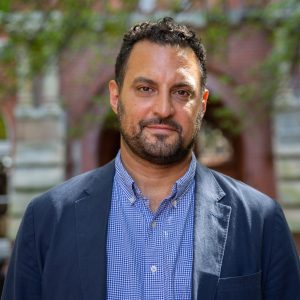 “It is my sincere aspiration that the CJC, through its wide range of course offerings ranging from the humanities, Hebrew language, international affairs and Holocaust studies, helps its students and the wider Georgetown community to better understand and appreciate the multifaceted aspects of the past, present and future of Jewish Civilization,” Lincoln says.
“It is my sincere aspiration that the CJC, through its wide range of course offerings ranging from the humanities, Hebrew language, international affairs and Holocaust studies, helps its students and the wider Georgetown community to better understand and appreciate the multifaceted aspects of the past, present and future of Jewish Civilization,” Lincoln says.
The CJC is an interdisciplinary teaching and research unit at SFS that strives to create and promote scholarship on Jewish Civilization. The Program for Jewish Civilization (PJC) was founded in 2003 by the SFS, under the leadership of Georgetown’s Jewish chaplain, Rabbi Harold White, and Georgetown professors Robert J. Lieber and Yossi Shain. The PJC was relaunched as the CJC in 2016, and has continued to promote a deeper understanding of the world’s religious communities.
Bringing Global Experience to the Hilltop
Lincoln spent fifteen years with the United Nations Secretariat where he had a varied career, most recently as the head of office for the UN deputy special coordinator based in Jerusalem, working on the coordination of UN and international development assistance to Palestinians in Gaza and the West Bank.
Prior to his appointment in Jerusalem, Lincoln served as the senior political affairs officer for North Africa, managing a team of political affairs officers covering Libya, Tunisia, Algeria, Morocco, and support for the personal envoy of the secretary-general on Western Sahara. Before that role, Lincoln was a political affairs officer with UNMIS/S and the UN special envoy for Sudan and South Sudan, working primarily from Juba, South Sudan.
“These experiences, alongside my academic training at the University of Wisconsin Madison and at SOAS at the University of London, are what informs my teaching as well as what I hope to bring to the study of Jewish Civilization,” Lincoln says.
Lincoln has also worked with the Washington Institute for Near East Policy, the Council on Foreign Relations and the International Crisis Group.
“Having worked for most of my career on various aspects of conflict resolution and prevention and having engaged in inter-communal and inter-religious dialogue, I see these as core values for the CJC that are also entirely consistent with Georgetown’s mission as embodied in its Jesuit heritage.”
Fostering the CJC on Campus
Lincoln aspires to grow the CJC and share facets of Jewish civilization with more students on campus. In the short term, this means working closely with CJC faculty to amplify the center and its mission.
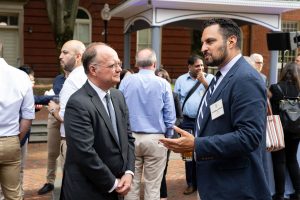
“I also want to ensure that the CJC is well positioned to contribute effectively to the many debates, on campus and beyond, concerning the Jewish experience in the United States, as it relates to global affairs and of course the impact of the unprecedented political crisis taking place in Israel,” Lincoln shares. “I see the CJC as a collaborative center, working closely with the other centers and programs of the SFS and the University to foster these discussions and to enhance our course offerings.”
Over the long term, Lincoln hopes to see the CJC’s enrollment grow, including in the Hebrew language program. Additionally, he would also like to see more students participate in at least one CJC course during their time at Georgetown.
Coinciding with a Changing Climate
In the current uncertain global political climate, Georgetown’s continuous investment in the study of Jewish Civilization serves as an important hub for academics to come together and exchange ideas and research. Lincoln’s extensive experiences from his career also serve as a unique resource for curious students.
“In addition to academic sources, I like to share anecdotes from my experiences, and offer an insider’s perspective on events that the students are reading about,” he says. “Given the dramatic changes taking place across the world that have such an outsized impact on Jewish Civilization, I think it is important to produce events for students that help explain the implications of phenomena such as rising anti-semitism and shifts in Israeli politics on the areas of study at the CJC. And it is just as important to expose students and our community to the latest scholarship on Jewish Civilization including History, the study of the Holocaust, art, music, literature and film. It is this combination of offerings that makes the CJC unique within the broader framework of the SFS and helps to complement the CJC’s already robust academic programming.”
As Lincoln transitions to director, he reflects on his time thus far at Georgetown and his future with the CJC.
“Admittedly, what I didn’t expect was to feel as connected to the students as I have over the past two years. What I am looking forward to most is to work closely with the students and faculty to see how we can uphold and improve the reputation of the CJC as fostering strong and vibrant academic and social engagement within the wider Georgetown community.”
CJC Booktalk: Jews, Muslims, and the French Republic
The Center for Jewish Civilization invites you to register for the following special event, co-sponsored by the BMW Center for German and European Studies and the Alwaleed bin Talal Center for Muslim-Christian Understanding.
RSVP HERE
Thursday, September 21st 12:30pm-1:30pm EST
ICC 270, Georgetown University
In this book, Dr. Steven Kramer explores the complex, triangular relationship between the French Republic, Jews, and Muslims. It is the first book to compare the experience of French Jews and Muslims over the longue durée, tracing their experiences and interactions in both metropolitan France and the colonies under the evolving regime of laïcité. This historical and comparative approach does more than illuminate past and current tensions, it suggests how they may be resolved.
If you would like to join this book talk over Zoom, please email Laurie Batschi at lb1307@georgetown.edu for the Zoom link.
Speaker:
Moderator:
The Protocols of the Elders of Zion – The Challenge and Promise of Technology
The Protocols of the Elders of Zion: 120 years of Antisemitic Propaganda
Panel Summary – What is to be Done, Part 2: The Challenge and Promise of Technology
The last panel of the symposium considered the double-edged sword of networked communication technology, where powerful platforms enabled and inspired communication, collaboration, and creation unimaginable just a decade ago and today face a new threat landscape that benefits from its connective tissues. Daniel Byman of Georgetown University moderated a conversation between Justin Erlich, Elizabeth Neumann, and Cynthia Miller-Idriss as they discussed the current threats and what we must do about them. Our panelists established that antisemitism is not just an isolated threat or restricted to a defined community but is instead a deep-seated virus that is a starting and end point to all forms of radicalized hate online in the ‘propaganda train:’ misogyny, homophobia, xenophobia, among others. Next, panelists discussed ways to stop the spread of hateful ideologies online and prevent youth from becoming radicalized, discussing solutions from short-form ‘pre-bunking’ videos that teach people how to recognize when they are being manipulated to on-the-ground initiatives with parents, coaches, teachers, faith leaders, and other communities to create behavioral change. Tech companies like TikTok also seek to address harmful content online through five vectors – policies, enforcement, empowerment, education, and partnerships – and to strike a balance between empowering users and institutionally removing content. Community solutions were designated as some of the most foundational and impactful aspects of CVE/CT work, supplementing online tools and education. As the threat landscape has changed since 9/11, government structures to fight dangerous content have failed to update, and the focus of advocates has thus shifted to grassroots initiatives and education. Furthermore, technology has made CT harder, as our society faces increased exposure to online content available at all times. The politicization of content and words like ‘disinformation’ have also complicated the panelists’ and other advocates’ work as they navigate learning curves in publicizing and advertising information about combating harmful online content to the public. A further complicating factor is the lack of government investment in community-based solutions, with panelists noting that questions about long-term projects like building community trust and reducing recidivism rates for radicalization remain unasked and unanswered.
Notable Quotes
Justin Erlich – “Coded words are one of the great challenges here. We’re constantly trying to keep up without overkilling content that may be used in counterspeech or that may have some sort of neutral context. So this is some kind of the ongoing work that we (TikTok) rely on our partners – trusted NGOs and civil servant groups – to help us with.”
Elizabeth Neumann – “Most companies trying to police their terms of service are limited by usually leveraging government designations of what a terrorist group is – and it’s not necessarily focused on movements. And so, Seamus (Hughes), in the previous panel, talked about how there is this artificiality in the way that the government functions: we designate terrorist organizations, we don’t designate terrorist movements. And the law is structured around organizations, not movements. So a lot of the tools, both in the federal government and the tools that the tech companies rely on, are not there to address antisemitism as a movement or as a type of content that we want to prohibit. So we have to get more creative.”
Cynthia Miller-Idriss – “One of the things that strike me is that we are often talking about antisemitism, or antisemites, or even ‘The Antisemite’ as if it’s some kind of bounded or very recognizable and identifiable thing. I think that one of the things that we find in the (Polarization and Extremism Research & Innovation) lab is that antisemitism tends to be not just a starting point for the propaganda that we see online but it’s also the endpoint as well. It doesn’t matter where you get on the ‘propaganda train,’ whether it’s antisemitism or anti-immigration or male supremacism, it always ends up on antisemitism. You go far enough down the rabbit hole, and you get there.”
Speaker Biographies
Daniel Byman, Georgetown University
Daniel Byman is a professor in the School of Foreign Service with a concurrent appointment with the Department of Government. He is an editor at Lawfare and a member of the Department of State’s International Security Advisory Board. He served as Vice Dean of the SFS undergraduate program from 2015 until 2020 and before that as director of Georgetown’s Security Studies Program and Center for Security Studies from 2005 until 2010. He also led a Georgetown team in teaching a “Massive Open Online Course” (MOOC) on terrorism and counterterrorism for EdX. Professor Byman is also a part-time Senior Fellow at the Center for Middle East Policy at the Brookings Institution. From 2002 to 2004 he served as a Professional Staff Member with the 9/11 Commission and with the Joint 9/11 Inquiry Staff of the House and Senate Intelligence Committees. Before joining the Inquiry Staff he was the Research Director of the Center for Middle East Public Policy at the RAND Corporation. Previous to this, Professor Byman worked as an analyst on the Middle East for the U.S. government.
Justin Erlich, TikTok
Justin is the Global Head of Issue Policy and Outreach & Partnerships for the Trust & Safety team at TikTok. He leads teams that develop global policy framework, engage with civil society and communities, and incubate Responsible Innovation practices. He also regularly teaches courses on Disruptive Technology & Regulation at the UC Berkeley Law School. Harnessing his strategic and policy background, he focuses on building organizations that operate in highly-regulated environments. He combines big-picture thinking with executive leadership to deliver tangible impact. He is driven by a passion to ensure tech platforms bring us together rather than drive us apart. Prior to joining TikTok, Justin worked in the urban mobility tech sector at Uber as Global Head of Policy for Autonomous Vehicles & Urban Aviation and the V.P. of Strategy, Policy & Legal at Voyage. He served as the Principal Tech Advisor for the former California Attorney General and current Vice President Kamala Harris, overseeing the Department’s work on privacy, data, tech platforms, and the regulation of emerging technologies. He also spent 5 years at McKinsey & Co. as a consultant, with a focus on cities and the social sector. He has a degree in Government with related fields in economics and behavioral psychology from Harvard University, and holds a J.D. from New York University School of Law. He is a member of the California State bar.
Elizabeth Neumann, Moonshot
Elizabeth Neumann is the Chief Strategy Officer for Moonshot, a tech-driven solutions provider harnessing the power of the internet for good. We develop new technology and methodologies to expose threats, disrupt malicious actors and protect vulnerable audiences online. We work to end online harms – such as violent extremism, disinformation, child sexual exploitation, gender-based violence, and human trafficking – making communities, governments, and businesses safer, both online and off, around the world. Previously, Ms. Neumann served as the Assistant Secretary for Counterterrorism and Threat Prevention at DHS where she led eight program and policy teams addressing a range of issues including domestic violent extremism, screening and vetting, countering terrorism and transnational criminal organizations, countering hostile UAS (drones), and human trafficking. Over the past two decades, Ms. Neumann created and implemented multiple government-wide reforms, primarily in the areas of security and public safety. Ms. Neumann began her homeland security work in the aftermath of 9/11, serving on the inaugural staff of the White House Homeland Security Council (now part of the National Security Council). Ms. Neumann is a Board Member of the National Immigration Forum, founder and member of the Council on National Security and Immigration, and a National Security Contributor at ABC News.
Cynthia Miller-Idriss, Polarization and Extremism Research & Innovation Lab (PERIL), American University
Dr. Cynthia Miller-Idriss is a Professor in the School of Public Affairs and in the School of Education at the American University in Washington, DC, where she is also the founding director of the Polarization and Extremism Research and Innovation Lab (PERIL). She is a Draper Richards Kaplan Foundation Entrepreneur and recently served as the inaugural creative lead for the Alexander von Humboldt Foundation’s residency program on social cohesion in Berlin, Germany. Dr. Miller-Idriss regularly testifies before the U.S. Congress and briefs policy, security, education and intelligence agencies in the U.S., the United Nations, and other countries on trends in domestic violent extremism and strategies for prevention and disengagement. She is the author, co-author, or co-editor of six books, including her most recent book, Hate in the Homeland: The New Global Far Right (Princeton University Press, 2022). She is currently at work on a new book on the gendered dimensions of violent extremism. Dr. Miller-Idriss writes frequently for mainstream audiences, as an opinion columnist for MSNBC and in other recent by-lines in The New York Times, The Atlantic, Foreign Affairs, The Washington Post, Politico, USA Today, The Boston Globe, and more
The Protocols of the Elders of Zion – Overcoming Antisemitism and Anti-Zionism: The Abraham Accords
The Protocols of the Elders of Zion: 120 years of Antisemitic Propaganda
Panel Summary – Overcoming Antisemitism and Anti-Zionism: The Abraham Accords
The symposium’s lunch roundtable in the second half of the conference analyzed how historic accords between Israel and Arab states served to help combat antisemitism worldwide. The panelists, Ambassador Dennis Ross, Ed Husain, and Michael Doran, participated in a conversation led by the Director of the Center for Jewish Civilization, Dr. Bruce Hoffman. An underlying current of the panelists’ opening presentations was that the regional shift to see Israel as a contributor to the shared Abrahamic and Quranic heritage of the Middle East did not happen in a vacuum; rather, it was a process over the last seven years primarily led by Bahrain and the United Arab Emirates. From a 2015 celebration of Hanukkah between King Hamad bin Isa Al Khalifa of Bahrain and a rabbi from New York to the thriving Jewish communities living and practicing their faith in the UAE, there are many cultural- and faith-based narratives that laid the foundation for the Abraham Accords, despite the extremist messaging from Iran and al-Qaeda claiming that Jews and Christians don’t belong in the Arabian Peninsula. Our panelists noted that establishing normal relations with Israel from the ground up, rather than the bureaucratic top-down ‘normalization’ of relations, is opening the door for Saudi Arabia to gradually publicize its relationship with Israel – in pursuit of its broader attempts to increase tourism and influence – thus opening the door for other states like Jordan and Egypt to follow suit. However, the US is seemingly missing an opportunity to use the Abraham Accords as a springboard for creating a new security dynamic in the Middle East, with its allies – Israel in particular – stepping up to combat Iranian influence through regional cooperation. This is key to countering the Iranian critique of Israel as an illegitimate state, especially as the US’s own conception that progress cannot be made in the Middle East until the Israeli-Palestinian problem is resolved additionally hinders regional cooperation. Yet it is important to note that the Israeli-Palestinian conflict undoubtedly amplifies tension, China is inserting its influence in the region, and the Biden Administration must weigh its choices with the risk of consequences related to Iranian oil or military escalation if they take a more aggressive policy stance. Our panelists sought to balance sobering reality, driven by recent headlines, with hope for the future, leaning on the shared heritage and historic tolerance and diversity of the Middle Eastern region.
Notable Quotes
Dennis Ross – “I get asked the question, ‘How are the Abraham Accords changing the region?’ And what I say is that it’s a good question but not the right one. The right question is, ‘How did the region change to make the Abraham Accords possible?’ And what we know, what we see, is that increasingly, especially among the Gulf States but not exclusively there, you have more and more Arab States come to the realization that they have their own interests that they need to pursue, and they looked at Israel as actually being a country that could contribute greatly to that.”
Ed Husain – “The Abraham Accords was called a word called Abraham for a reason: and that is because there is a common inheritance across the Middle East that celebrates our fathers – Ishmael and Isaac. Both lines, as the Bible says, will produce great civilizations and great nations. And we see that Biblical and Quranic inheritance at play here.”
Michael Doran – “There is an opportunity that’s being missed by the Biden Administration right now with regard to the Abraham Accords. When they came into power, they didn’t even want to acknowledge the Abraham Accords; they downplayed it because it was an achievement of the other team, an achievement that they had always said was impossible without an advance on the Palestinian track. And they’ve come around on that, which is all for the better, and they now are embracing normalization. But what’s missing from their approach is the security dimension, a full development in the security dimension. They don’t want to actually aggressively contain Iran. So the Abraham Accords is there as an integration of Israel into the region – especially an economic integration, but it’s only partially there with regard to missile defense. We can now see the foundation being laid for a region-wide missile defense network, but you can’t have a real containment of Iran without aggressive countermeasures. And I think that this is hindering the development of the Abraham Accords as the nucleus of a really serious defense relationship.”
Speaker Biographies
Dr. Bruce Hoffman, Georgetown University
Bruce Hoffman is the Shelby Cullom and Kathryn W. Davis senior fellow for counterterrorism and homeland security at the Council on Foreign Relations. He has been studying terrorism and insurgency for four decades. He is a tenured professor at Georgetown University’s Edmund A. Walsh School of Foreign Service, where he is the director of the Center for Jewish Civilization. Hoffman was previously director of both the Center for Security Studies and the Security Studies program from 2010-2017.
Ambassador Dennis Ross, Georgetown University
Ambassador Dennis Ross is Counselor and Ziegler Distinguished Fellow at The Washington Institute for Near East Policy. Ambassador Ross played a leading role in shaping U.S. involvement in the Middle East peace process within the H.W. Bush and Clinton administrations. He was instrumental in assisting Israelis and Palestinians to reach the 1995 Interim Agreement, successfully brokering the 1997 Hebron Accord, and facilitating the 1994 Israel-Jordan peace treaty. Ambassador Ross has worked closely with Secretaries of State James Baker, Warren Christopher, and Madeleine Albright. He was awarded the Presidential Medal for Distinguished Federal Civilian Service by President Clinton.
Ed Husain, Georgetown University
Ed Husain is a British writer and political advisor who has worked with leaders and governments across the world. He has held senior fellowships at think tanks in London and New York, including at the Council on Foreign Relations (CFR) at the height of the Arab uprisings (2010-2015). While at CFR, his policy innovation memo led to the US-led creation of a Geneva-based global fund to help counter terrorism. Husain was a senior advisor to former British Prime Minister Tony Blair (2015-2018). From 2018-2021 he completed his doctoral studies on Western philosophy and Islam under the direction of the English philosopher Sir Roger Scruton. He is the author of The Islamist (Penguin, 2007), The House of Islam: A Global History (Bloomsbury, 2018), and Among the Mosques (Bloomsbury, 2021). His writing has been shortlisted for the George Orwell Prize. A regular contributor to the Spectator magazine, he has appeared on the BBC and CNN and has written for the Telegraph, The Times, the New York Times, the Guardian, and other publications. He has traveled to more than forty countries.
Michael Doran, Hudson Institute
Michael Doran is a senior fellow and director of the Center for Peace and Security in the Middle East at Hudson Institute. He specializes in Middle East security issues and co-hosts the Counterbalance podcast. In the administration of President George W. Bush, Doran served in the White House as a senior director in the National Security Council, where he was responsible for helping to devise and coordinate United States strategies on a variety of Middle East issues, including Arab-Israeli relations and US efforts to contain Iran and Syria. He also served in the Bush administration as a senior advisor in the State Department and a deputy assistant secretary of defense in the Pentagon. Born in Kokomo, Indiana, Doran went to elementary school in Carmel, outside of Indianapolis, before his family moved to Fullerton, California, where he graduated from Sunny Hills High School. He received a BA from Stanford University and an MA and PhD in Near Eastern studies from Princeton University. Before coming to Hudson, Doran was a senior fellow at the Brookings Institution. He has also held teaching positions at New York University, Princeton University, and the University of Central Florida. His latest book, Ike’s Gamble, was published by Free Press in 2016. He appears frequently on television, and has published extensively in Foreign Affairs, the American Interest, Commentary, Mosaic, the Wall Street Journal, the Washington Post, and the New York Times.
The Protocols of the Elders of Zion – Why the Jews?
The Protocols of the Elders of Zion: 120 years of Antisemitic Propaganda
Panel Summary – Why the Jews?
The first panel of day one of the symposium on the Protocols of the Elders of Zion, moderated by Dr. Bruce Hoffman, Director of the Center for Jewish Civilization, and featuring Aaron Keyak, Ira Forman, Pamela Nadell, and Izabella Tabarovsky, asked and answered: “Why the Jews?” Panelists traced the deep tradition of antisemitism in the American and global consciousness and unpacked its prejudices, ranging from Jews as scapegoats to the notion of antisemites’ punching up’ in the fight against the dominant, corrupt power of the Jews. Antisemitism has always simmered under the surface and has surfaced through new media innovations: Henry Ford with non-copyrighted printed material, Father Coughlin with a radio audience a fourth the size of the U.S. population, and antisemites now, emboldened through the amplifying power of social media. Yet the recent normalization of antisemitism – such as the 2017 Unite the Right rally or Kanye West’s Twitter rants – is a worrying trend. The panelists also sought to define what antisemitism is, examining it through its different manifestations: fears over Jewish world control from the Protocols, racial antisemitism from Nazi Germany, and Christian antisemitism from the New Testament. But does it matter? Our panelists wrestled with the complexity of the topic and the difficulty of defining ‘the Jews’ as a singular entity, noting that antisemites often engage in larger-scale attacks against vague groups of targets. Disagreements over the definition of antisemitism can also get in the way of combating it: our panelists discussed how an antisemitic action is an antisemitic action, whether committed by Jews in Israel or by a hate group standing over Interstate 405 in Los Angeles. Keyak, Forman, Nadell, and Tabarovsky also discussed how to move forward, starting with addressing the false conflation between antisemitism and the Israeli-Palestinian conflict – an end to conflict in the region will not lead to the end of antisemitism or terrorism, as added by Hoffman. Perhaps we can impose a social cost on antisemitism, making it no longer acceptable to express such hate; perhaps we are in a better position to fight against it with dedicated government support, resources, and access.
Notable Quotes
Aaron Keyak – “Antisemitism is the canary in the coal mine in the fight for democracy. What happens when the antisemite think that the Jew is behind the media, behind our banks, behind our government – that these actors, these leaders in the political realm or the financial realm or in media – are being controlled by the Jew, it’s destabilizing to a society. You don’t think that the leaders are accountable to you or to anyone else and are simply being controlled by this nefarious’ other,” the Jew. And once you believe that these leaders can be held accountable to the voters or other modes of accountability, you don’t believe in your democracy anymore. the antisemite, fundamentally, in the way that they see the world, does not have confidence in the way that normal people would look at democracy.”
Ira Forman – “As we think about combating antisemitism, we should understand we are not n the business of ending antisemitism. It has been around for thousands of years, and it’s going to be around well after I’m gone, well after my grandchildren are gone, and well after my great-great-great-grandchildren are gone. This isn’t rocket science. This is just experience, and it’s not pessimistic either because if it is impossible for us to eradicate, then I think there’s a good metaphor. It’s a faucet. The faucet has been turned on, and what we can do is turn it down to a drip. And that is our job and our mission.”
Pamela Nadell – “Does it really matter that we define the Jews? I don’t see any reason – first, it’s impossible to define Jews, but most importantly, it doesn’t really matter to the antisemites. They don’t define the Jews; they use it as a broad category as a way of attacking all sorts of other things and attacking civilization.”
Izabella Tabarovsky – “We often hear that antisemitism and anti-Zionism are not the same. In principle, they don’t have to be. But in practice, and this is what history teaches us, most of the time, they are. They are the same in the most critical way possible because both lead to antisemitic outcomes for Jews. There is a reason for that, and the reason is that the kind of anti-Zionism that we hear today that dominates the discourse today on the left very much relies on the tropes and ideas of antisemitic conspiracy theory as laid out in the Protocols of Zion.”
Speaker Biographies
Dr. Bruce Hoffman, Georgetown University
Bruce Hoffman is the Shelby Cullom and Kathryn W. Davis senior fellow for counterterrorism and homeland security at the Council on Foreign Relations. He has been studying terrorism and insurgency for four decades. He is a tenured professor at Georgetown University’s Edmund A. Walsh School of Foreign Service, where he is the director of the Center for Jewish Civilization. Hoffman was previously director of both the Center for Security Studies and the Security Studies program from 2010-2017.
Aaron Keyak, U.S. Department of State
Aaron Keyak currently serves as the Deputy Special Envoy to Monitor and Combat Antisemitism at the U.S. Department of State. In helping lead this office, he works to advance U.S. foreign policy to counter antisemitism throughout the world. Deputy Special Envoy Keyak is an experienced leader and interfaith coalition builder who has previously held senior roles advising members of Congress, the Obama Administration, and the Biden-Harris Administration transition team.
Ira Forman, Georgetown University
Ira Forman is a Senior Fellow on Antisemitism at the Center for Jewish Civilization and a Senior Fellow at the Moment Institute. In the fall of 2018, he was appointed Senior Advisor on Antisemitism at Human Rights First. Mr. Forman served as the State Department’s Special Envoy to Monitor and Combat Antisemitism from 2013-2017. From 2011-2012 he served as the Jewish Outreach Director for the Obama for America campaign. He also served for nearly 15 years as the Executive Director of the National Jewish Democratic Council (NJDC).
Pamela Nadell, American University
Pamela S. Nadell holds the Patrick Clendenen Chair in Women’s and Gender History and is Director of the Jewish Studies Program. A specialist in American Jewish history and women’s history, she teaches a variety of courses in Jewish civilization. Her awards include A.U.’s highest faculty award, Scholar/Teacher of the Year (2007). Pamela Nadell’s books include America’s Jewish Women: A History from Colonial Times to Today (W.W. Norton, 2019), named Jewish Book of the Year by the Jewish Book Council. Past president of the Association for Jewish Studies, Nadell’s other titles include Women Who Would Be Rabbis: A History of Women’s Ordination, 1889–1985 (Beacon Press, 1998).
Izabella Tabarovsky, Wilson Center
Izabella Tabarovsky is the Kennan Institute Senior Advisor on Regional Partnerships and Programming. She oversees the Institute’s regional partnerships and programming, its independent journalism initiatives, and its Historical Memory initiative. She manages the Kennan Institute’s Russia File, Focus Ukraine, and In Other Words blogs, and co-hosts its Russia File podcast. She has coordinated Kennan’s U.S.-Israel working group on Russia in the Middle East, Kennan’s alumni conferences, and other initiatives and events. Her research expertise includes politics of historical memory, Russia’s independent media, the Holocaust, Stalin’s repressions, and Soviet and contemporary left antisemitism.
View our Fall 2023 Courses!
The Center for Jewish Civilization is pleased to announce its lineup of Fall 2023 courses!
1-Credit Courses
- The Text is Personal: Writing My Story Through the Jewish Story | Rabbi Schaefer | JCIV-1014
- The Text is Personal: Writing My Story Through the Jewish Story. What does it mean to be in relationship with Jewish texts? How do these texts help us understand and tell our story? In this course, we’ll read both short and long form writing by rabbis and authors who use the Torah, Talmud, and other Jewish texts, as a mirror, prism, and filter for how they understand their lives and journeys. Over five sessions we’ll study Ilana Kurshan’s All the Seas are Ink, Aviya Kushner’s The Grammar of God, and sermons from modern rabbis, while writing their own reflections and personal essays using text to tell their story.
- German Catholics in Hitler’s Army | Prof. Suzanne Brown-Fleming | JCIV-1031
- In 1933 when Adolf Hitler was elected Chancellor of Germany, the German population was overwhelmingly Christian. In 1933 there were 40 million Protestants, 20 million Catholics, and small numbers of people adhering to other Christian traditions. Germany’s territorial expansion that began in the 1930’s meant millions of people, Christian and Jewish, came to be under the control of the Nazi state. The German Army, or Wehrmacht (1935-1945) became a tool for vast territorial expansion, and, in some cases, for war crimes and murder of civilians and Jews. How did Catholics in the Wehrmacht see and understand their role? Why did some participate while others refused to do so, even at the cost of their own lives? This course will examine the role of Catholics in the Wehrmacht, including its crimes against Jews and other civilians. We will examine photographs, diary excerpts and film to come to a closer understanding of the inner lives and decisions of Catholic soldiers.
Core Courses
- Intro to Jewish Civilization | Prof. Meital Orr (point of contact) and CJC Faculty | JCIV-1990
- This course will provide a holistic, multi-disciplinary approach to understanding Jewish Civilization, and will be taught by a different faculty member from the Center for Jewish Civilization (CJC) every week, each of whom will teach the area of their expertise. Students will learn the history of the Jewish people from ancient times to modern-day Israel, including in-depth coverage of the Holocaust and the development of Zionism. Students will learn about Judaism through major Jewish texts, denominations, holidays and life-cycle events – and about Jewish culture, through a global lens on Jewish literature, film and music. Students will learn about historic relations between Islam and Judaism, the Arab world and Israel, as well as how to think about the Israeli-Palestinian conflict. Students will also learn about Jewish engagement with American democracy, and global Jewish realities impacted by increasing antisemitism and white Supremacism in the 20th and 21st centuries. Having learned about the many foundational aspects of Jewish civilization, students will then have the opportunity to pursue further knowledge in any area of the course, through thematically based classes at the CJC by any of the experts from whom they have learned in this course.
- Jewish Civilization Senior Colloquium | Prof. Anna Sommer | JCIV-4960
- As part of the Minor and Certificate in Jewish Civilization students complete a capstone experience: either a traditional research thesis or a project with a creative component. The capstone project will be a topic related to Jewish civilization, prepared under the supervision of a faculty member associated with the Center for Jewish Civilization, the Visiting Professor of Jewish Civilization, Goldman Visiting Israeli Professor, or if appropriate special permission may be granted by the program director for another Georgetown faculty member to serve as essay advisor. Upon completion, seniors make a presentation of their research at the annual senior thesis colloquium held during commencement week, where a prize is awarded to the outstanding paper.
Hebrew Courses
- Intensive Beginning Modern Hebrew I | Prof. Sara Grayson | HEBR-1001
- This course focuses on expanding useful vocabulary, topics and usage of grammatical knowledge in a gradual sequence. It provides a thorough grounding in reading, writing, grammar, oral comprehension, and speaking. It is an interactive program and uses a variety of methods both for teaching and learning. No prior knowledge of the language is required.
- Intermediate Modern Hebrew I | Prof. Meital Orr | HEBR-2001
- This course advances students’ knowledge of Modern Israeli Hebrew by developing the skills acquired during the first two semesters of Intensive Beginning Modern Hebrew. Among the many grammar concepts covered are: verb structures in the future tense, impersonal sentences in all tenses, nominal and possessive sentences in the future, the conditional and the subjunctive. The course will enrich student knowledge through textbook lessons, student and teacher conversations, the listening and analysis of textbook readings and newspaper articles, oral presentations, and a variety of audiovisual activities including Israeli songs and films. The course covers the first eight chapters of Hebrew from Scratch, Volume 2. Prerequisite: two semesters of Intensive Beginning Modern Hebrew at Georgetown, or the equivalent on the placement exam.
- Advanced Modern Hebrew I | Prof. Sara Grayson | HEBR-3001
- Pre-requisite: HEBR-2002 or permission of instructor. This advanced level course is designed for students who have completed two years of Hebrew study. It will include advanced grammar exercises in the different verb paradigms. Students read and analyze newspaper articles and works by authors and will be engaged in writing exercises. . Students will watch and give a review on movies and Israeli TV programs. Fluency in speaking will be the main goal of the conversational drills included in the course.
Holocaust and Genocide Studies
- Theological Implications of the Holocaust | Prof. Ori Soltes | JCIV-1761
- The Holocaust is recognized as one of the traumatic moments in human history. The uniquely systematic depths of human-human interaction it revealed, paired with daring acts of heroism which the period yielded, have raised a range of questions which challenge long-held assumptions about what humanity is, if and what God is, and how to understand the concepts of good and evil. This course will have as its goal to assess the Holocaust as it has been approached by a range of thinkers, and to place it within the larger context of theology, history, art and thought. While our primary backdrop will be theological questions provoked by its narrative — from both Jewish and Christian perspectives — we will inevitably encompass the larger historical picture of Jewish-Christian, Jewish-Jewish, Christian-Christian and human-divine relations. We will also consider the importance, in the later part of the twentieth century, of visual (and other) art as a means of response — both in the expression of anger and in seeking healing –to this trauma.
- Holocaust By Bullets | Fr. Patrick Desbois and Prof. Andrej Umansky | JCIV-2766
- While many students are familiar with the main lines of the Nazi extermination of Jews in Western Europe during World War II, few know that a parallel effort was waged in the East. There, Nazis killed Jews methodically, but not in mass camps built for extermination. Instead, the Nazis conceived of mobile killing units which wiped out the Jewish population of small villages, resulting in more than a million and a half more Jewish deaths than is commonly realized. Fr. Patrick Desbois, a forensic anthropologist and author of “Holocaust by Bullets,” will team teach a course that examines the Holocaust in general and this little known chapter in particular.
- Forgotten Women: Victims of Violence in Mass Crimes and the Holocaust | Fr. Patrick Desbois and Prof. Andrej Umansky | JCIV-4500
- Why is violence against women and girls are so frequently forgotten or “silenced” in mass crimes and genocide? Why are acts of violence against women and girls so frequently obliterated from the Holocaust narrative? From the Roma genocide narrative? From Guatemala’s mass violence history? From ISIS’ terrorist narrative before the courts of law? From news emerging from Ukraine? Do ground investigations have the capacity to reveal the crimes against women, or are they choosing not to? This course will investigate these questions, especially taking into account the field investigations of Fr. Patrick Desbois and his team. Students will learn how to conduct forensic investigations of violence against women in the scope of genocide and mass crimes.The course is co-taught by Fr. Desbois, a forensic anthropologist and author of The Holocaust by Bullets and The Terrorist Factory and Dr. Andrej Umansky, a historian and lawyer will teach during this class.
Humanities and Literature
- Fiction Writing Workshop: What is a Story? | Prof. David Ebenbach | JCIV-1758
- In this class, you’ll answer the question “What Is a Story?” To do that, you’ll immerse yourselves in the art and discipline of story writing. Partly this means acquiring a writer’s critical eye for fiction, so you’ll study the basic elements of successful fiction (character, plot, description, etc.) and use these tools to read and analyze stories. Specifically, we’ll be considering the example of Jewish fiction, surveying the short story tradition in Jewish literature. Because the writer above all learns through doing, you’ll write a great deal of your own fiction (which does not need to be Jewish, of course)—regular exercises as well as more fully developed and revised work. Much of this development will happen as a result of the workshop process, where you’ll give one another extensive feedback on work submitted to the class as a whole.
- Interfaith Marriage in Lit & Film | Prof. Meital Orr | JCIV-1766
- This course will examine works of literature and film, from the early 20th century to the present day, which focus on the controversial subject and increasingly prevalent reality of interfaith and intercultural relationships and marriages. The course will begin with a view toward the Jewish perspective on this issue (from Biblical to Israeli) covered in the first three weeks, with the remainder of the semester devoted to the navigation of this complex terrain by different religious and national groups in international literature and film, among them: Christians and Muslims, Arabs, Africans and African-Americans, Asians and Asian-Americans, Indians and Pakistanis, Hispanics and Latinx, the LGBTQ community, and Native Americans. Texts will include primary works of fiction and cinema, and secondary works by literature and film critics, sociologists and anthropologists. Inquiry will focus on ways in which the concerns of each group have intersected, reflecting communal pressures as well as changing realities and norms. The multiplicity of perspectives across all groups, bely both the need to marry within the fold to preserve communal, religious-cultural values, along with a growing admission of the reality of increasing diversity in modern, pluralistic societies and the benefits these bring.
- Magic and Religion | Prof. Ori Soltes | JCIV-1890
- The world of the Greeks and Roman was one of endlessly multi-aspected paganism, with its consciousness of a range of gods and goddesses, daimons and spirits moving between their realm and ours. It was also one in which the Hebrew-Israelite-Judaean competed with paganism and continued to struggle to define itself—and ultimately split into what became Judaism and Christianity. This course will focus on the times, places and literatures that reflect the interface between paganism as it has evolved within the Greco-Roman world and nascent Judaism and Christianity. It pushes toward an understanding of how Judaism and Christianity emerged out of the Hebrew-Israelite-Judaean tradition as two forms of faith each claiming to be the proper continuation of that tradition. It considers how their theological relationship—their competition regarding the Truth regarding divinity and its relationship to humanity—is not only affected by their mutual interface and their theological relationships with paganism but by the political context of the pagan Roman Imperium in which they both develop. This is a world of meeting, divergence, convergence, synthesis, embrace and rejection of religious principles and ideas. It is a world in which verbal distinctions that we take for granted—such as those between magic and religion, myth and theology, superstition and true belief, astronomy and astrology—have not yet assumed the place to which they arrived within our vocabulary, over time. Our goal is largely to come to understand what comprises the key elements that distinguish and join these traditions, why and how this vocabulary emerges and evolves, and how the shaping of that vocabulary has affected and continues to affect our sense of what Judaism and Christianity are.
- History of Antisemitism | Prof. Jonathan Ray | JCIV-2103
- Antisemitism has been a persistent phenomenon in Western (and other) cultures for over two thousand years. This course will examine the nature and historical development of anti-Jewish sentiment and Antisemitic theories, from their roots in the ancient pagan world to their current political and social expressions. We will discuss the texts and ideas that shaped attitudes toward the Jews throughout history, giving special attention to the ways in which they intersected with politics, literature, religion, and popular culture. Finally, we will consider the different ways in which both Jews and non-Jews have responded to Antisemitic behavior and beliefs.
- Jews on Trial | Prof. Ori Soltes | JCIV-2751
- This course begins by asking when and how law became separate from religion in the Israelite-Judaean world. It moves on to consider how we might evaluate and understand the narrative of Jesus’ trial and demise in the Gospels in light of information outside those accounts within Judaean, pagan Roman and early Jewish literature. Noting that, regardless of the details that favor or disfavor the Gospel account, many generations of Christians have accept it as unequivocally true, the book goes on with a review that is both concise and extensive of the history of Christian-Jewish relations, examining that relationship through a legal and quasi-legal lens. From medieval Blood Libels to the notorious Dreyfus Affair and from the story of Leo Frank’s trial and eventual murder to that of Adolph Eichmann’s trial and execution to that of Jonathan Pollard’s trial behind closed doors and ongoing incarceration, the narrative suggests that the Jew seems always to be on trial in the courtroom of journalistic and historiographic examination, whether as the accused, the accuser, the jury or the judge.
- Arguing with God: The Bible as Literature | Prof. Meital Orr | JCIV-2761
- The Bible is the bestselling book of all time and for millions the word of God, yet its main heroes have no qualms about arguing with their Creator, and they’ve inspired a worldwide artistic and philosophical tradition of doing the same. Profoundly inspired by the narratives of the Bible, some of the greatest artists and thinkers in history have responded by appropriating Biblical stories to their unique places and times, producing enduring works of literature, philosophy, visual art, music and film. In the process, they reveal the universal beauty, power and wisdom of the Bible – its profound insight into the human condition, and the eternal human struggle to understand and accept some of its most difficult messages. This course will explore how different interpreters from various faith traditions, from classical to modern times – and in multiple genres – “argue” or converse with and challenge, the Biblical text, and by extension, God who wrote it. Each week, we will focus on interpretations of a different Biblical text by artists and thinkers such as: John Steinbeck, Herman Melville, Emily Dickinson, Thomas Mann, Soren Kierkegaard, Vladimir Jabotinsky, Joseph Roth, Yehuda Amichai, Elie Wiesel, Geraldine Brooks, Leonard Cohen, Bob Dylan, Marc Chagall and Sigmund Freud. No previous knowledge of the Bible is required. Course also listed as INAF 2761.
International Affairs and Diplomacy
- Congress & Making Middle East Foreign Policy | Prof. Danielle Pletka | JCIV-2758
- Congress & the Making of Middle East Foreign Policy – taught by Danielle Pletka, Senior Vice President of Foreign and Defense Policy Studies at the American Enterprise Institute (AEI). While foreign policy is the constitutional prerogative of the president, for much of recent history, it has been the Congress that has led the way in shaping US foreign policy toward the Middle East. From aid to Israel and sanctions against Iran to the war on terror, the legislative branch has influenced America’s role in the world in ways that few appreciate. Beginning with a detailed overview of the legislative process, this course will explore how Congress has shaped the modern Middle East, looking at key pieces of legislation and historical and contemporary case studies.
- The Weaponization of Hate: Antisemitism, Racism, Islamophobia, and Xenophobia in the COVID-19 Pandemic era | Prof. Jacob Ware | JCIV-2768
- The Weaponization of Hate: Antisemitism, Racism, Islamophobia, and Xenophobia in the COVID-19 Pandemic era. Over the past several years, the Western world has suffered a dangerous rise in far-right extremism, providing an imminent terrorism and hate crime threat to Jewish communities, as well as Muslims, African Americans, and, in some cases, women. This class will assess the ideological underpinnings of the anti-Semitic far-right, trace the movement’s rise in the Obama and Trump years, analyze the current movement’s tactical and communications preferences, and evaluate ongoing and future counterterrorism and countering violent extremism measures. The aim is to provide an extensive and objective assessment of the current threat to Jewish communities and beyond, and to offer students an introduction to the counterterrorism world and to underscore the importance of understanding and fighting hate in all its forms.
- The Societal, Political and Security Implications of Israel’s Relations with the Arab and Muslim World | Prof. Jonathan Lincoln | JCIV-2970
- The Societal, Political and Security Implications of Israel’s Relations with the Arab and Muslim World. This course will undertake a broad review of Israel’s relations with the Arab and Muslim World in four modules. The first will review the development of Israel’s relations with Arab and Muslim majority countries in the Middle East and North Africa, from the pre-state period through the major military confrontations of 1948, 1957, 1967 and 1973. It will then look the implications of the peace treaty with Egypt as well as Israel’s wars in Lebanon and confrontation with the PLO. The second will look more internally at the implications of Jewish immigration from the Middle East and North Africa on the state formation process, the state’s approaches to its non-Jewish minority populations as well as the Palestinian population in the occupied territories (Gaza and the West Bank). The third module will take a closer look at the development of relations between Israel, Egypt, Jordan, Turkey, and Iran. During the last module, students will study the impact of recent political changes in the Middle East. Specifically, they will evaluate what the end of the Cold War, the Arab Spring, and the Abraham Accords have meant for both Israel’s diplomatic relations in the region and the Israeli-Palestinian conflict.
- History of Peace-Making in the Middle East | Amb. Dennis Ross | JCIV-3751
- This course will deal with the history of the Arab-Israeli conflict and the efforts to resolve it. One basic point to understand about the conflict is that it is not a morality play. One side is not all right and the other all wrong. That is not to say that they are equally responsible for what has happened, but it is to say that both have suffered and both would benefit enormously from ending the conflict and its animating grievances. We will explore why each side tends to see the world the way it does, and why mythologies have taken hold of all sides and made reality hard to grasp. We will examine narratives of the Israelis, the Palestinians, and the Arabs more generally. Mindsets must be understood in any negotiation, and we will look at what shaped each side’s approach to the conflict historically as well as its approach to conflict resolution over the periods of the most intensive diplomacy. We will analyze how close the efforts in the year 2000 came to ending the conflict between Israelis and Palestinians and Israelis and Syrian, and will discuss what lessons must be learned from the past in order to shape a different future. We will also consider the American role as well as that of outside parties in trying to resolve the conflict. Ultimately, the purpose of the course is to provide insight into why it has been so difficult to settle this conflict, and what, if anything can be done to settle it in the future.
- Islam, Judaism and Western Civilization | Prof. Ed Husain | JCIV-3890
- Governments and non-state actors are fomenting conflicts and wars by perverting religion, history and identity. This course investigates Jewish and Islamic influences that form today’s Western civilisation. It has been designed to equip students with a deeper understanding of the modern West, evaluate the narrative of clash of civilisations, and explore a synthesis of civilisations. With extremism and anti-Americanism on the rise in the Muslim world, and anti-Semitism and anti-Muslim sentiment increasing in the West, this course excavates the intellectual roots of the threats ripping apart modern civilisation.
- Jewish-Muslim Coexistence in the Middle East and North Africa | Prof. Ed Husain | JCIV-4447
- This course will analyze the past, present and future(s) of Jewish-Muslim social, political, and religious relations from the beginnings of Islam until the Abraham Accords. We will traverse through Arabia, Morocco, Turkey, Israel, Egypt, Syria, Iran and Arabia. Drawing on a depth of history and culture, we will study policy implications for the U.S. government, its allies, and the directions to be taken at the contemporary crossroads of Jewish-Muslim relations in the Middle East.
- Memory Wars: Ukraine, Russia & Eastern Europe | Prof. Diana Dumitru | JCIV-4630
- What is the context of Putin’s bewildering claim of “de-Nazifying” Ukraine in his current war? Why are the European celebrations of May 8 and May 9 – the end of WWII – a constant source of conflict inside societies in Eastern Europe? Why does the history of WWII create tensions in the post-Soviet space, leading to jailed historians, protest movements, and diplomatic expulsions? Why has 20th century history remained such a gripping topic in peoples’ minds today, and how has it shaped contemporary relations between countries in the region? This course will help students to find answers to these and other challenging questions related to the unprecedented weaponization of history and memory in the region.

